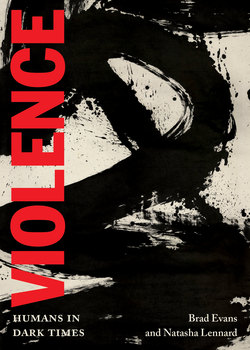Читать книгу Violence - Brad Evans - Страница 2
На сайте Литреса книга снята с продажи.
ОглавлениеPRAISE FOR VIOLENCE: HUMANS IN DARK TIMES
“Many of us live today with a pervasive sense of unease, worried that our own safety is at risk, or that of our loved ones, or that of people whose bad circumstances appear to us through networked media. Violence feels ever-present. Natasha Lennard and Brad Evans help us to analyze those feelings, talking with a wide range of thinkers in order to gain insight into the worst of what humans do, and challenging us to imagine a world in which violence is no longer a given. Their book is full of surprising insights and intelligent compassion.”
—Sarah Leonard, co-editor of The Future We Want: Radical Ideas for the New Century
“In Violence, Brad Evans and Natasha Lennard have created, alongside their interview subjects, a kaleidoscopic exploration of the concept of violence, in terrains expected and not, in prose taut and unexpectedly gorgeous. Their philosophical rigor provides the reader with an intellectual arsenal against the violence of the current moment.”
—Molly Crabapple, author of Drawing Blood
“This is a book that will make everyone feel clever. Reflections on violence, both actual, and the possibility of, mediating so much of social interaction, also makes for critical reading. The range of interviews with leading academics, to filmmakers and artists, is impressive, at once immediate and relevant, but also profoundly philosophical. More essentially, though, the conversations underline the need and suggest ways to resist and organize in a visionary way, in the extraordinary times we live in.”
—Razia Iqbal, BBC News
“Standing on their own, the interview subjects featured in Violence: Humans In Dark Times might be identified as the foremost intellectuals, artists, and activists engaged with questions of how violence moves, acts, and is witnessed in the world. But summoned together in this collection by two political thinkers distinguished by both their unmatched intellects and their willingness to deploy those intellects in acts of service rather than performance, their voices materialize as a creative space large and fertile enough to lay the groundwork for an actionable hope. The result is a groundbreaking testament to the vital role of the abstract and the theoretical for understanding the depth to which violence is entrenched in human experience and consciousness and to the necessity of empathetic intellectual stewards like Lennard and Evans to direct such understanding into transformative action. We would be wise to read this collection with a similar eye toward service, and in so doing, open ourselves up to the rare mercy of no longer having to stand on our own.”
—Alana Massey, author of All The Lives I Want
